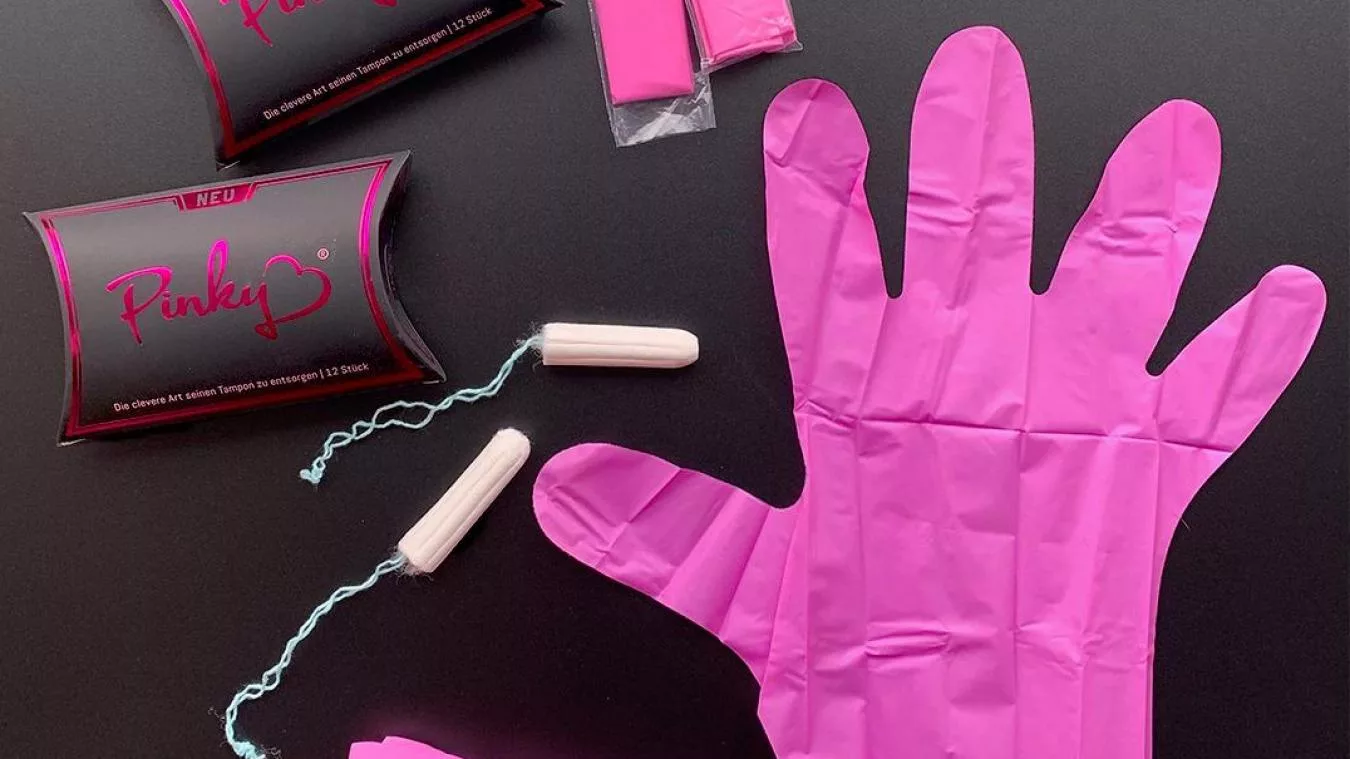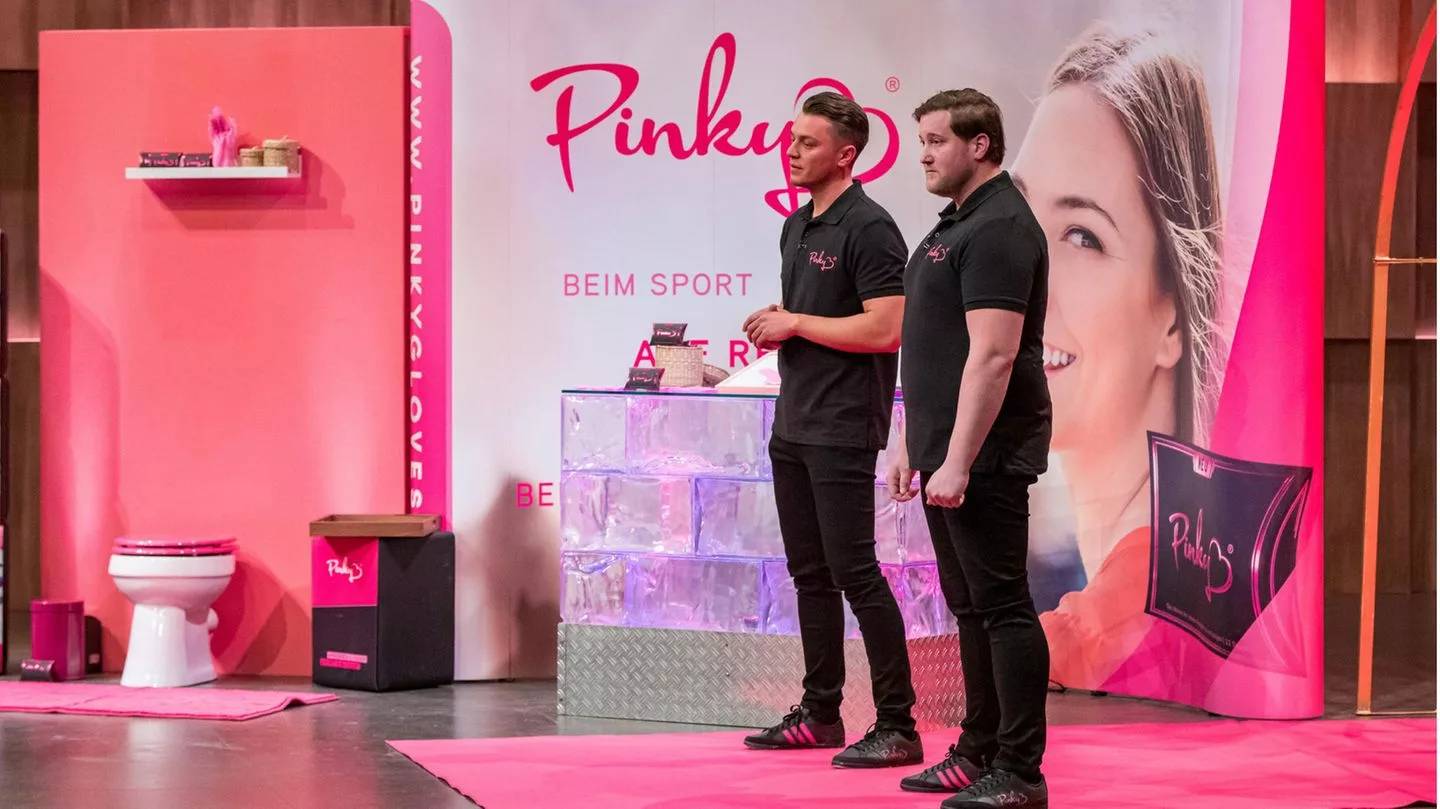Your cart is currently empty!

Pinky Gloves: The Menstrual Product No One Needed
Most of the time on social media, I stay in my little left-wing intersectional feminist bubble, which always believes in people’s agency, especially when it comes to sexuality. Sometimes, however rarely, this bubble explodes into a thousand pieces. Pinky Gloves have had that effect.
From idea to controversy
The whole thing started with two cis men who, after living with women and realizing that the bathroom trash can emitted odours at certain times of the month, banded together as white knights to find the “solution” no one needed: gloves designed to be used specifically for menstruation.

As valiant warriors fighting against the imperfection that is this particular bodily fluid, they appeared on the German version of Dragon’s Den. One of the potential investors, a businessman (obviously) found this idea brilliant and decided to finance it and assist our two protagonists in their epic quest for “cleaner” periods. Note that this man had previously refused to invest in a menstrual product that was created by women, because he considered it to be too niche.
Long story short, Pinky Gloves are gloves—bright pink, of course—designed to be worn to pull out a tampon, and to then be used to wrap up the used tampon (I don’t know if these men have ever heard of toilet paper, but I digress). And of course, one would need to put on another Pink Glove to insert a new tampon. Have these two never heard of soap and water? It makes me wonder (and worry!) about their general hygiene, but again, I digress. What’s more is that they even claimed that their product was environmentally friendly, even though it’s disposable and single-use. As some would say, “I can’t even.”
This product angers me. it’s unnecessary, it’s wasteful, and it’s an additional expense for people who are generally paid less than cis men, in addition to creating more stigma and increasing disgust and shame around periods. It’s literally capitalizing on a non-existent problem and to add insult to injury, the product is marketed to women, without taking into account other people who menstruate.
I also find this product insulting, condescending, and paternalistic. Having cis men tell people who menstruate that we should take extra precautions to avoid offending their poor little noses with our vaginal and menstrual smells makes me livid. We don’t need a product telling us that this biological function is “disgusting” when we already have to deal with its symptoms on a monthly basis. We do not need cis men positioning themselves as our “saviours.”
Fortunately, after a week of objections and impassioned responses from people all over the internet, the product was withdrawn from the market. Despite all this, it’s important to talk about it because it’s yet another example of the audacity of cis men who want to solve a “problem” they know nothing about. According to them, their product’s purpose was to help de-stigmatize periods. Clearly, they barely consulted the people concerned, if at all.
- Anyone with a uterus has experienced menstrual taboo. We’re therefore best positioned to lead the fight against period stigma.
- We believe that a fuchsia-coloured product isn’t exactly discreet.
- We know that latex gloves sell for a fraction of the (intended) price of Pinky Gloves (oh, pink tax, why don’t you just die already?).
Most of all, we know that hiding and secrecy is not a solution to shame and stigma: it’s necessary to talk about periods. The topic should be addressed in sex ed classes with all students. It’s important that all students understand that it doesn’t only concern “girls.”
The idea of putting used pads and tampons in our purses on top of illicit products to successfully smuggle them into an event doesn’t come out of nowhere. It deters grown men from searching our bags. But this begs the question: do men really think we actually walk around with used pads and tampons in our purses?
Solutions proposed by the people concerned
We need positive examples of people who openly talk about menstruation the way we talk about what we had for lunch. For example, the runner who, for personal comfort, chose not to wear a tampon for a marathon, became a symbol of the destigmatization of menstruation.
We need initiatives that guarantee free access to menstrual products for all people who need them. This is what Monthly Dignity does, which is a non-profit organization founded in 2017 to fight period poverty in Montreal. Since its founding, Monthly Dignity’s all-volunteer team has coordinated the donation of more than 190,000 (!!!) menstrual products to schools and partner organizations.
Period poverty refers to the inability to afford or access the products necessary to experience one’s periods with hygiene and dignity. For about a third of Canadians under the age of 25 who menstruate, buying a box of tampons is an expense that directly undercuts their monthly budget. For vulnerable and marginalized people, menstruation is not just an inconvenience, but a real barrier to full societal participation. Indeed, how do you show up to school or work when you’re bleeding without any “protection”?
Period poverty also stems from a flagrant lack of education about the menstrual cycle and how to manage it. We also need to just be able to talk about it without shame. When I started using a menstrual cup back in 2005, I became one of those annoying people who just couldn’t shut up about its benefits. At the time, what I didn’t realize was that it opened up the conversation about menstruation. My friends and I started talking about period pain, our menstrual cycles (flow, frequency, length, etc.), and the impact it’s had on our lives. These were very important discussions, and I hope that they empowered my friends to have them with others, because one of the most effective ways of breaking a taboo is by simply discussing it, and not just amongst ourselves.
Menstruation is a normal biological function experienced by nearly half of the global population. Shame and disgust have no place in discussions and discourses about periods. Let’s talk about periods and even show them, if necessary! It shouldn’t have taken until 2017 for a menstrual product commercial to show blood. The signature blue liquid that too often stands in for blood in these ads has no doubt contributed to period stigma, and it’s time for it to stop.
-
Canadian Labour Institute for Social and Economic Fairness (2017). Pink tax: Women pay high price for being female. Canadian Labour Institute for Social and Economic Fairness. http://www.canadianlabourinstitute.org/story/pink-tax
Mahdawi, A. (2021, 21 avril). Pinky Gloves are just the latest ludicrous attempt to monetise the vagina. The Guardian. https://www.theguardian.com/commentisfree/2021/apr/21/pinky-gloves-are-just-the-latest-ludicrous-attempt-to-monetise-the-vagina
Medina-Perucha, L., Jacques-Aviñó, C., Valls-Llobet, C., Turbau-Valls, R., Pinzón, D., Hernández, L., … & Berenguera, A. (2020). Menstrual health and period poverty among young people who menstruate in the Barcelona metropolitan area (Spain): protocol of a mixed-methods study. BMJ open, 10(7), e035914.
RQASF. (2020, February 10). STOP à la précarité menstruelle. Campagne Rouge. https://rqasf.qc.ca/campagnerouge/precarite-menstruelle/stop-a-la-precarite-menstruelle/
Rydström, K. (2020). Degendering menstruation: Making trans menstruators matter. The palgrave handbook of critical menstruation studies, 945-959.







